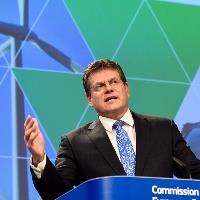(BRUSSELS) – The EU’s annual State of the Energy Union report, published Wednesday, showed Europe’s economy moving away from fossil fuels, but at a pace criticised as too slow to meet the goals of the Paris Agreement.
The report looks at progress made since the publication of the first State of the Energy Union in November 2015. In terms of greenhouse gas emissions, energy efficiency and renewable energy, the report confirms the EU is well on track to meet its 2020 climate and energy targets, and the climate target in particular is set to be largely overshot.
“Europe is well on track to meet its 2020 climate and energy targets”, said Miguel Arias Canete, Commissioner for Climate Action and Energy: “Despite the current geopolitical uncertainties, Europe is forging ahead with the clean energy transition.”
“Renewable energy is now cost-competitive and sometimes cheaper than fossil fuels, employs over one million people in Europe, and has reduced our fossil fuels imports bill by 16 billion,” he added.
The Commission points to concrete legislative and non-legislative initiatives in 2016, particularly the “Clean Energy for all Europeans” package presented on 30 November last year.
The EU as a whole made good progress on the 2020 energy and climate targets, says the EU executive. It has achieved its 2020 final energy consumption target, as well as greenhouse gas emissions: in 2015, EU greenhouse gas emissions were 22% below the 1990 level.
It says the EU is also on track in the renewable sector where based on 2014 data the share of renewables reached 16 % of the EU’s gross final energy consumption.
And the EU continues to “successfully decouple its economic growth from its greenhouse gas emissions: during the 1990-2015 period, the EU’s combined Gross Domestic Product (GDP) grew by 50 %, while total emissions decreased by 22 %”.
Finally, the report highlights a European low emission mobility strategy whose ambition is that by mid-century, greenhouse gas emissions from transport “should be at least 60 % lower than in 1990 and be firmly on the path towards zero, while ensuring the mobility needs of people and goods as well as global connectivity”.
Environmental groups are not so impressed, however, criticising the EU’s energy plans as inadequate to meet the challenge of climate change and commitments made at the 2015 Paris climate conference.
“To keep global warming below 1.5 degrees, as agreed in Paris”, says Greenpeace EU energy policy adviser Sebastian Mang, “the EU must accelerate its move to 100 per cent renewable energy, and it must scrap subsidies for fossil fuels.”
Wendel Trio, Director of CAN Europe, said the EU has set the bar far too low: “Aligning the energy transition with the Paris Agreement will require more ambitious climate and energy targets, strong legislation, and additional measures such as deadlines for phasing out fossil fuels,” he said.
Progress on energy efficiency - guide
Progress on renewables - guide
Second State of the Energy Union Communication and all accompanying documents



